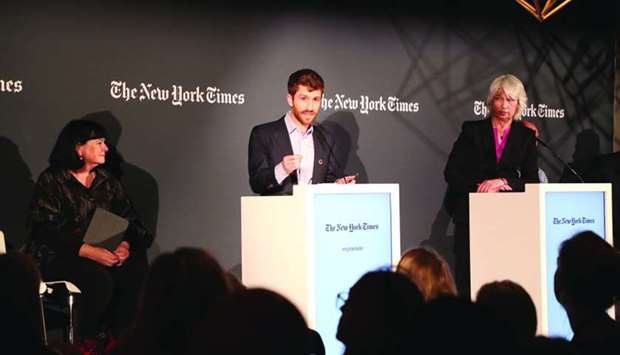Big tech companies are transforming economies and societies, and influencing people’s lives, but cannot be trusted to regulate themselves, speakers argued at a QatarDebate-sponsored event in Davos, held in collaboration with The New York Times.
The Oxford-style debate organised by the Qatar Foundation member and the US newspaper, on the sidelines of the World Economic Forum’s 50th annual meeting, saw six speakers go head-to-head as they discussed whether a new regulatory board needs to permanently change the tech landscape, or if companies should be allowed to self-regulate.
“I want you to think about the age we’re living through. It’s an age of anger as trust in governments and major institutions is broken, because of the failure to protect people and share prosperity,” said Sharan Burrow, general secretary, International Trade Union Confederation, arguing for the motion that big tech cannot be trusted to self-regulate.
“The impact of big tech companies is not helping because they’re subverting privacy, competition, and indeed democracies as they’re becoming global monopolies. And who has the right to monopolise power? We’ve never accepted it from governments; traditionally we’ve never accepted it from corporations.”
Lisa Witter, co-founder and executive chairperson, Apolitical, told the debate: “Big tech is calling for this regulation – CEOs are asking for help,” referencing tech bosses such as Mark Zuckerberg of Facebook, Microsoft president Brad Smith, and Sundar Pichai, CEO of Alphabet, who last week said there was “no question” that AI needs regulation.
However, Rebecca Masisak, chief executive officer, TechSoup, argued against the motion, saying that self-regulation requires a multi-disciplined stakeholder approach. “Can we trust governments? Governments have agendas, too,” she claimed. “At times, they’re really not keeping in mind what’s best for citizens. And governments are not global, whereas the problems are.
“We can trust big tech to self-regulate with a model that engages a diverse set of global stakeholders, businesses, governments, and academia, and also big tech employees and grassroots civil society. The several million employees in big tech across 50 countries have the potential to meaningfully influence big tech to self-regulate.”
Malcolm Frank, president, Digital Business, Cognizant, suggested that big tech companies are already, to an extent, regulated by the public. “Switching costs are unbelievably low for this industry,” he told the debate. “You don’t like Google Maps? Go to Apple Maps. Don’t like Bing? Go to Google. With such insanely low switching costs, digital companies are already properly regulated in many important ways.”
Once the speakers had presented their arguments, the judges critiqued the discussions and posed additional challenges to the debaters.
“I want you to think about the age we’re living through. It’s an age of anger as trust in governments and major institutions is broken, because of the failure to protect people and share prosperity,” said Sharan Burrow, general secretary, International Trade Union Confederation, arguing for the motion that big tech cannot be trusted to self-regulate.
“The impact of big tech companies is not helping because they’re subverting privacy, competition, and indeed democracies as they’re becoming global monopolies. And who has the right to monopolise power? We’ve never accepted it from governments; traditionally we’ve never accepted it from corporations.”
Lisa Witter, co-founder and executive chairperson, Apolitical, told the debate: “Big tech is calling for this regulation – CEOs are asking for help,” referencing tech bosses such as Mark Zuckerberg of Facebook, Microsoft president Brad Smith, and Sundar Pichai, CEO of Alphabet, who last week said there was “no question” that AI needs regulation.
However, Rebecca Masisak, chief executive officer, TechSoup, argued against the motion, saying that self-regulation requires a multi-disciplined stakeholder approach. “Can we trust governments? Governments have agendas, too,” she claimed. “At times, they’re really not keeping in mind what’s best for citizens. And governments are not global, whereas the problems are.
“We can trust big tech to self-regulate with a model that engages a diverse set of global stakeholders, businesses, governments, and academia, and also big tech employees and grassroots civil society. The several million employees in big tech across 50 countries have the potential to meaningfully influence big tech to self-regulate.”
Malcolm Frank, president, Digital Business, Cognizant, suggested that big tech companies are already, to an extent, regulated by the public. “Switching costs are unbelievably low for this industry,” he told the debate. “You don’t like Google Maps? Go to Apple Maps. Don’t like Bing? Go to Google. With such insanely low switching costs, digital companies are already properly regulated in many important ways.”
Once the speakers had presented their arguments, the judges critiqued the discussions and posed additional challenges to the debaters.



